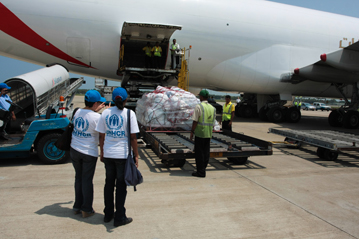Hands-on donors help ease refugee problems in Iran
Hands-on donors help ease refugee problems in Iran

TEHRAN, Iran, May 29 (UNHCR) - When it comes to refugees, diplomats from donor nations in Iran like to roll up their sleeves and get out into the field to assess needs. And then many of them raise funds themselves.
Envoys from countries like Austria, Belgium, Denmark, Finland, Italy, Mexico, the Netherlands, Sweden, Switzerland and the United Kingdom don't just assess projects and recommend funding; they also organize concerts, bazaars and other activities to raise awareness about Afghan and Iraqi refugees in Iran as well as to raise money for refugee projects.
These efforts go some way to supporting the significant contribution by the Iranian government, which currently hosts some 900,000 registered Afghan refugees and 54,000 Iraqi refugees.
"It is very important for donors to go to the field and see the challenges faced by refugees and [look at] areas where we can help," said Swiss Consul Sabine Ulmann, who met Afghan refugees in north-east Iran earlier this year while visiting Khorasan Razavi province with a party of European diplomats.
In the city of Mashad, they visited a small library funded by the UN refugee agency, and listened as Afghan refugee students spoke about their needs and their concerns. The refugees explained some of the challenges they faced in getting into university.
Education is a major concern for the Afghan refugees - access to it, and the cost. Most Afghan refugees now pay some registration fees if they want their children to attend Iranian public schools.
Until 2004, they enjoyed education support from UNHCR, but the refugee agency has decided to concentrate more resources on aiding the reintegration of Afghan returnees in their homeland.
"The longer the refugees stay in Iran, the more difficult they will find it to repatriate," Ali Jafarinejad, the director general of the Bureau for Aliens and Foreign Immigrant Affairs in Khorasan Razavi, told the diplomats, while calling for support and assistance both in Iran and Afghanistan.
Travelling to places like Khorasan Razavi and meeting people like Jafarinejad are immensely helpful for donor nation diplomats, who hear of the problems first hand and are able to assess the best ways that their governments can help.
And many embassies in Tehran are doing their bit for the refugees. The Belgium mission, for example, donated three computers to the Golshahr library following the visit to Khorasan Razavi.
Last year, the Mexican embassy organized a charity bazaar, which managed to raise US$12,000 to build classrooms for female Afghan refugees in Kerman province. A group of donors had earlier visited the province and heard about the needs.
The Italian and Norwegian embassies, meanwhile, joined forces with the UN refugee agency to hold a charity concert that raised money for a UNHCR project for disabled refugee children in Sistan-Baluchistan province in the south-east.
The South African Ambassador, a former refugee, has donated clothes, toys and educational materials to newly arrived Iraqi refugees, while the embassy of Finland has set aside funds for independent aid agencies working to improve the situation of children, including refugees.
Material assistance aside, some embassies are seeking to build the institutional capacity to help refugees. The Dutch embassy is supporting the establishment of an Afghan refugee secretariat at the Afghan embassy in Tehran. Other embassies, including those of Greece and Norway, have offered to finance specific projects involving refugees.
By Dina Faramarzi in Tehran, Iran









